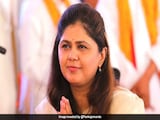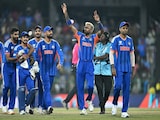President Pranab Mukherjee had observed that Rahul Gandhi's "theatrics" of gate-crashing Ajay Maken's press conference on 27 September 2013 and trashing a UPA government ordinance "was the final nail in the coffin for the Congress". He felt, after the party's Vice President "had shown such disdain for his own government", why should people vote for the Congress again?
As President of India, Mukherjee had reservations about the ordinance himself, and had conveyed the same to ministers. However he was aghast at Rahul's brazenness in describing the collective wisdom of the Union Cabinet as "nonsense", at a time when Prime Minister Manmohan Singh was abroad.
"What right does he have to humiliate the PM like this?" he noted in his diary. "He has all the arrogance of his Gandhi-Nehru lineage without their political acumen," he added and observed, "Maybe politics wasn't his (Rahul's) calling."
Another event that chagrined Mukherjee as a minister was in July 2009, soon after Manmohan Singh and Pakistan PM Yusuf Gilani issued the controversial Sharm el Sheikh declaration. Congress president Sonia Gandhi called Mukherjee, AK Anthony and Ahmed Patel for a meeting, excluding the PM, in which it was proposed that the party ought to distance itself from the PM's stand. Patel suggested that PM be advised to pre-consult Sonia Gandhi on all issues." I told them we cannot denigrate the office of the PM," Mukherjee noted.
Mukherjee felt hurt when despite his pleading, Sonia Gandhi did not allow the cortege carrying the mortal remains of PV Narasimha Rao enter the Congress headquarters in December 2013 - he felt it was "disgraceful ". Commenting on the lack of respect shown by the Congress in recent years to Lal Bahadur Shastri and Narasimha Rao, Mukherjee sarcastically mentioned once that Sonia Gandhi and her children believe that apart from their own family, no other leader has made any contribution to the Congress or the nation.
This and many untold anecdotes of India's contemporary politics have been chronicled in the book, "Pranab, My Father", by Sharmistha Mukherjee. The President's daughter has relied on the notings in Mukherjee's diary (in which he regularly wrote each night before retiring to bed, after his advent in New Delhi as MP in July 1969). The diary is a chronicle of contemporary political history.
Mukherjee had bequeathed his diary to his daughter with a rider that its contents must be made public after his death. Sharmishtha has quoted extensively from the diary and has also relied upon the conversations she had with her father and with many of the dramatis personae, including Prime Minister Narendra Modi, who, in spite of the author at one point being active in the Congress (spokesperson of the party and assembly candidate), was helpful and candid while speaking on his relationship with Mukherjee.
The bonding between Modi and Mukherjee apparently began in the 1990s when Modi was in the BJP organisation. Mukherjee often ran into Modi during his morning walks. Modi used to touch his feet and told Sharmistha that despite belonging to opposite political poles he derived immense pleasure from these chance meetings and showed his respect by touching Mukherjee's feet. Perhaps Modi saw similarities with Mukherjee, a humble product of rural India, who had walked miles to attend school and had risen from being an ordinary grassroots party organiser.
(Modi did away with many past practices with colonial undertones after becoming PM in 2014. Soon after becoming India's 13th President in July 2012 Mukherjee had discarded the use of "His Excellency", in English and "Mahamahim" in Hindi, replacing them with "Honourable President" and "Rashtrapati Mahoday")
The diary notes that even when Modi met Mukherjee as Gujarat Chief Minister and sharply differed with him (as Union Minister) he always touched his feet. This practice continued when Modi went to see the President as Prime Minister-elect. After Mukherjee left Rashtrapati Bhavan, Modi continued to meet him. He even went to Mukherjee after his 2019 re-election.
On 26 May 2014, erstwhile Congress stalwart President Mukherjee swore in the Modi regime. Recalling his four-decade association with the Congress and that of his father (Kamadakinkar Mukherjee) who had earlier served the Congress for 40 years, Mukherjee wrote, "What enormous abjection in the 129-year-old grand party which brought freedom to this country and laid the basic foundation of a modern state".
He also noted his satisfaction that after 30 years, single party majority rule had returned at the Centre and that with this absolute majority, even if Modi accommodated his pre-poll NDA allies, "he can show them the door without risking the continuation of his government".
The book records the first meeting Modi had with Mukherjee after winning the 2014 election. After assuring him of his cooperation in running the government, the President sought an analysis of the elections from the PM-elect. Modi said after three decades a party had achieved an absolute majority. Mukherjee then asked, "What else?"
As Modi contemplated an answer, Mukherjee chipped in. 2014 was unique in the history of Lok Sabha elections as it featured a declared new face as the PM candidate, he said. "The people had not only voted for Modi's party but also for him as the PM".
This conversation was disclosed to the author by Modi, who said," I did not think of it that way till Dada pointed it out".
"Perhaps Modi was being modest, though modesty is perhaps not one of his greatest virtues," notes the author.
Mukherjee noted in his diary that night: "He (Modi) has clarity in his thoughts and has a professional approach to statecraft. He feels the pulse of the people very strongly. He wants to learn and does not pretend that he is 'Mr Know All'. As a hardcore RSS man he is fiercely patriotic and nationalist."
The author says Mukherjee told her a multiple times that in his opinion, "Modi is the only PM after Indira Gandhi who has the ability to feel the pulse of the people so acutely and accurately". On 23 October 2014, President wrote in his diary: "The PM's decision to spend Diwali with Jawans in Siachen and flood affected people in Srinagar speaks of his political sense which was not visible in any other PM except Indira Gandhi." This despite Mukherjee's avowed disagreement with Modi's "de-Nehrufication" moves.
Mukherjee felt that Rahul lacked the 'killer instinct' necessary for a party leader. On his meeting with Rahul post the 2014 poll debacle, he recorded, "Rahul gave me his views on the party in a most detached way, from a distance as an outsider as if he was not the face of the campaign and the main campaigner for the party".
Mukherjee noted in 2014 that he had been getting not very encouraging reports from his former colleagues in the Congress and that some of them had "poured venom" against Rahul and complained about his inaccessibility.
Ahead of the 2019 elections, Mukherjee told his daughter that he would acknowledge "the emergence of Rahul as leader if Congress wins 88 seats". In 2014 the party had 44; it won 52 in 2019. Thus Rahul perhaps failed Mukherjee's litmus test.
When Rahul quit as party chief post the poll drubbing, suggesting that a non-Gandhi be at the helm, Mukherjee wryly commented, "How much autonomy or authority would a non-Gandhi president have?" (On 7 December 2023, after being sworn in as Telangana Chief Minister, Revanth Reddy and his wife touched Sonia Gandhi's feet. Congress president Mallikarjun Kharge, standing next to her, was not accorded that respect.)
The Modi regime paid rare tribute to Mukherjee by making him preside over the midnight ceremony to launch Goods and Services Tax (GST) a fortnight before he was to demit office. Mukherjee as Finance Minister had been the author of the proposal, which was at that time opposed by BJP. Seven years later, when Modi implemented GST and described Mukherjee's presence in the event as a 'historical coincidence', Congress described the move as 'Gabbar Singh Tax' and opposed it by boycotting the launch event.
Mukherjee responded to the Congress stance by recording," Serious debates cannot be replaced by catchy slogans. People might remember your slogans, but will not pay attention to your arguments if you are simply trivialising the issue". Rahul's 'chowkidar chor hai', 'Panauti Modi' and similar diatribe could have been avoided, perhaps, if he had paid attention to the man whom his grandmother had anointed de facto Number Two in her 1980-84 regime.
(Shubhabrata Bhattacharya is a retired Editor and a public affairs commentator)
Disclaimer: These are the personal opinions of the author















